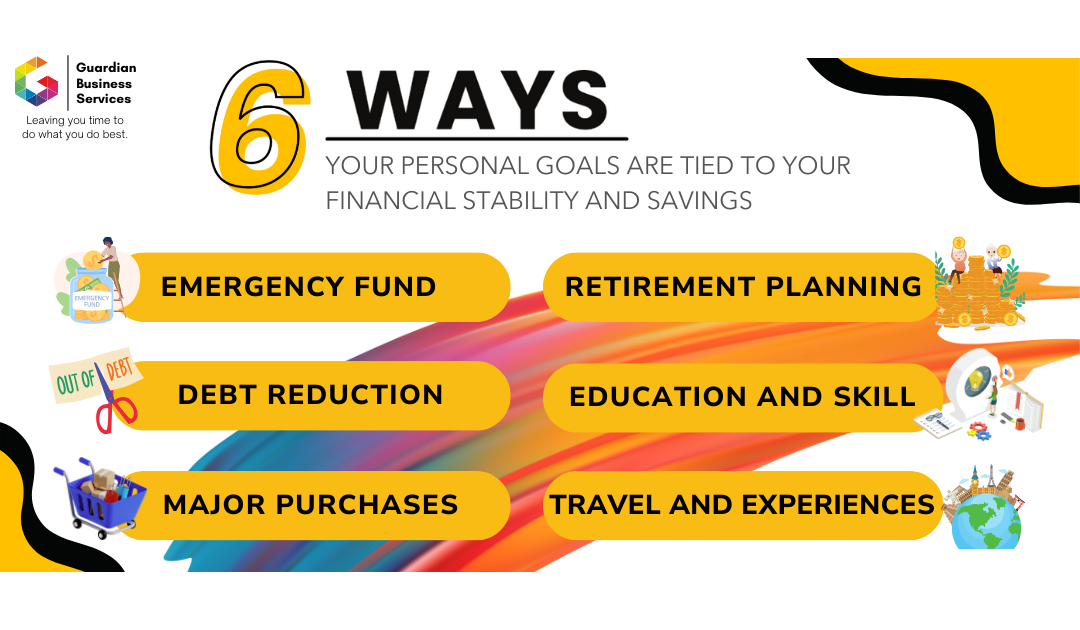When “personal goals” comes to mind, you may already know that being financially stable and having some savings are important, but you may not know exactly how much of an impact they have on all aspects of your life. Here are 6 ways your personal goals are tied to your financial stability and savings.
- Emergency Fund
- Debt Reduction
- Major Purchases
- Retirement Planning
- Education and Skill
- Travel and Experiences

Building an emergency fund is a vital part of financial stability. Life is unpredictable, and unexpected expenses like medical emergencies, car repairs, or job loss can occur at any moment. A well-funded emergency fund serves as a financial safety net, enabling you to manage unforeseen events without disrupting your progress toward personal goals.
Having an emergency fund offers several benefits for achieving financial stability.
- Safeguard against unexpected expenses: As an indispensable part of your financial strategy, an emergency fund safety net serves multiple crucial roles in your financial well-being. Whether it’s an unforeseen medical bill, the need for sudden car repairs, or unexpected home maintenance costs, your emergency fund stands ready to help you weather these financial storms without resorting to accumulating debt. It provides a buffer, ensuring that these unexpected challenges don’t derail your financial stability and long-term goals.
- Reduces stress and anxiety during challenging times: Beyond its purely financial utility, your emergency fund also plays a profound psychological role in your life. Knowing that you have a financial cushion to fall back on can alleviate unnecessary worrying that unexpected financial burdens can bring. This emotional relief allows you to direct your energy and attention towards finding effective solutions to the challenges you encounter. Instead of worrying about how to make ends meet during tough times, you can focus on devising strategies to overcome adversity with a clear and composed mind.
- Increases your financial resilience: In the unfortunate event that you experience a sudden job loss or a significant decrease in income, your emergency fund steps in to cover essential expenses. This not only prevents an immediate financial crisis, but also provides you with the peace of mind and financial flexibility to make thoughtful decisions during these transitions. It means you can pursue new employment opportunities or adapt to changes in your income without the pressure of immediate financial hardship.
In essence, your emergency fund is a cornerstone of your financial stability, allowing you to weather unexpected financial challenges while keeping you firmly on track towards your long-term financial goals without unnecessary setbacks.

Numerous individuals aim to achieve debt-free status as a part of their personal goals. Debts with high interest rates, such as credit card debt or student loans, can impose substantial burdens and obstruct progress towards other objectives. By prioritizing financial stability and directing resources towards repaying debts, you can release a portion of your income for future savings and investments. This will ultimately bring you closer to your personal aspirations.
Reducing debt plays an important role in attaining financial stability for several reasons:
- Reduced Financial Stress: Lowering debt decreases the financial strain and worry associated with owing money, allowing you to focus on building a more secure and stable financial future. This newfound peace of mind can significantly improve your mental and emotional well-being, as you no longer have to carry the weight of heavy debt burdens.
- Improved Cash Flow: As your debt decreases, so do your monthly debt payments, freeing up more of your income for saving, investing, and covering essential expenses. This improved cash flow can be a game-changer in your financial life, bringing you closer to achieving your personal goals and allowing you to make more strategic and informed financial decisions.
- Enhanced Credit Score: Paying off debts positively impacts your credit score, leading to better borrowing terms and interest rates in the future.
- Long-Term Financial Freedom: As debt dwindles, you have the capacity to allocate your funds towards income-generating assets like stocks, real estate, or retirement accounts. These investments can bolster your financial well-being, create passive income streams, and help you secure your financial future.
Ultimately, reducing debt opens doors to wealth-building opportunities, supporting your quest for long-term financial stability.

Personal goals frequently include substantial purchases, such as acquiring a house, a car, or financing higher education. Establishing financial stability and cultivating savings are crucial in making these purchases attainable. Through consistent saving and upholding a sound financial state, you can amass the required funds or become eligible for more favorable loan conditions, thereby empowering you to reach these significant milestones.
To achieve financial stability, consider these suggestions:
Smart Vehicle Choices and Housing Decisions
Major purchases like vehicles and housing have a significant impact on your finances. When looking for vehicles, opting for used cars instead of brand-new ones can save you a large amount of money. Look for models with good fuel efficiency and lower insurance costs. Similarly, in the realm of housing, explore more affordable options that align with your budget. If your current home is too large or costly for your financial comfort, consider downsizing or househacking, especially if it makes more financial sense.
Mindful Spending on Electronics and Furnishings
Another area where financial prudence can make a difference in reaching your personal goals is in your spending on electronics and home furnishings. Rather than constantly chasing the latest gadgets and electronics, make practical choices based on necessity. This not only saves you money but also prevents the accumulation of gadgets that may become outdated quickly. When furnishing your home, consider buying secondhand or refurbished furniture instead of brand-new items. This choice can significantly reduce costs while still providing you with quality pieces.
Wise Clothing and Accessories Purchases
Your approach to clothing and accessories can also impact your financial stability. Prioritize buying essentials and timeless pieces instead of constantly following fashion trends. This helps you save money over time and build a more secure financial future. Additionally, consider energy-efficient appliances for your home. While they may have a higher initial cost, they often have lower operating costs in the long run, which can benefit your finances.
Savings and Investments Over Luxury Items and Excessive Expenses
Redirecting funds from luxury items and excessive expenses towards savings and investments can significantly impact your financial well-being. Instead of buying high-end jewelry and luxury items, focus instead on building a solid financial foundation. Research before taking on home remodeling projects, which may not add substantial value to your property. When it comes to vacations and travel, explore budget-friendly options, consider local destinations, or opt for more affordable accommodations. Lastly, be prudent about fitness-related expenses. Choose cost-effective exercise options and avoid unnecessary gym memberships or expensive fitness equipment, allowing you to prioritize savings and investments for your future financial security.

Planning for retirement should be an important goal for everyone beginning early in life. Achieving financial stability, investing smartly and growing your savings account is imperative to guarantee a comfortable and secure retirement, allowing you to live the lifestyle you’ve envisioned.
By determining your retirement needs in advance, you shield yourself from potential financial uncertainties during your golden years. Moreover, the magic of compound growth comes into play when you start planning early. Beginning your retirement savings journey sooner enables your funds to benefit from compound interest and investment growth, resulting in a significantly larger sum at your disposal when retirement arrives.
Another important part of retirement planning is minimizing reliance on external sources. With a well-prepared retirement plan, you retain the autonomy to sustain your lifestyle without solely depending on family or governmental support. As healthcare needs often increase with age, proper retirement planning becomes a buffer against potential medical expenses. By accounting for healthcare costs in your plan, you mitigate the financial stress that can arise during your retirement years. This proactive approach not only ensures your physical well-being but also enhances your financial peace of mind.

Education and skill development are pivotal components in achieving financial stability due to several key reasons:
- Enhanced Earning Potential: Education equips you with knowledge and skills that are sought after in the job market, leading to better job opportunities and higher earning potential.
- Adaptability: Continuous skill development enables you to adapt to evolving industries and technological changes, ensuring your relevance in the workforce.
- Career Advancement: Education and skills are often prerequisites for career growth and promotions, leading to increased income and financial stability.
- Entrepreneurial Ventures: Education provides the foundation for starting and managing successful businesses, which can significantly impact your financial prospects.
- Investment in Yourself: Learning and skill-building are investments that appreciate over time, resulting in better job prospects and financial returns.
- Financial Literacy: Education fosters financial literacy, enabling you to make informed decisions about budgeting, investing, and managing debt.
- Diversified Income Streams: Acquiring new skills allows you to explore side gigs, freelancing, or consulting work, diversifying your income sources for added stability.
- Long-Term Planning: Education encourages a forward-thinking approach, helping you plan for retirement, homeownership, and other long-term financial and personal goals.
- Resilience during Economic Challenges: A strong education and versatile skill set provide a safety net during economic downturns, reducing the risk of job loss and financial setbacks.
- Lifelong Learning: Cultivating a mindset of continuous learning ensures you stay competitive in the job market, contributing to sustained financial stability throughout your life.
Incorporating education and skill development into your journey bolsters your earning potential, hones your financial acumen, and fosters adaptability, all of which are essential components of achieving enduring financial stability.

Many times, personal goals mean traveling, seeing new places, and having amazing experiences. But to make these dreams come true, you need more than just excitement; you need to be smart with your money and have a good foundation of stability. Financial stability doesn’t just mean having money; it means having the freedom to do what you want. It’s what lets you explore the world, discover different cultures, and make memories that you’ll always treasure.
Planning your money and setting aside savings specifically for travel and experiences is like building a bridge between your dreams and what you can really do. It means you’re taking steps towards turning those exciting ideas into real adventures without causing money problems. This approach changes daydreams of fun trips into well-thought-out plans, all because you’re putting aside money bit by bit. As you save more and more, the idea of going on exciting journeys, trying new foods, and experiencing new things gets closer and closer.
Because you’re financially stable, when you carefully plan a trip, it’s like putting together a puzzle of experiences that help you grow as a person. The stories you gather from all the places you visit are more than just stories; they change the way you see things, inspire you, and show you that a rich life isn’t just about having things, but about all the amazing things you do and the memories you collect.
Summary
As you can see, these 6 major areas of your life are directly tied to many personal goals that people commonly have. These areas must be addressed and must be in order so that you can move on and toward your dreams. Craft a good foundation for yourself, and your dreams can become a reality.
If you need help getting started, we’d be glad to talk with you. Quickbooks education and setup, personal bookkeeping, bank reconciliation, and profit and loss statement review for your business are just some of the services we offer.

